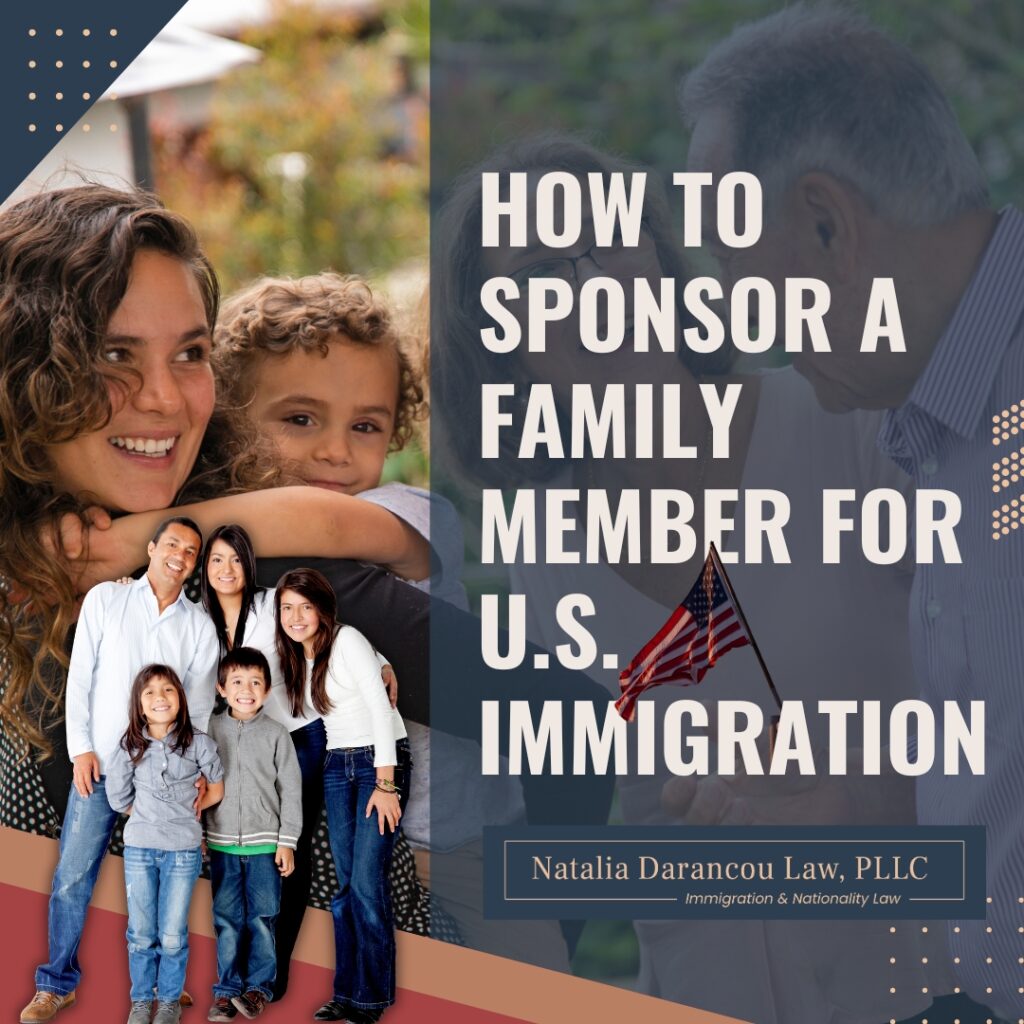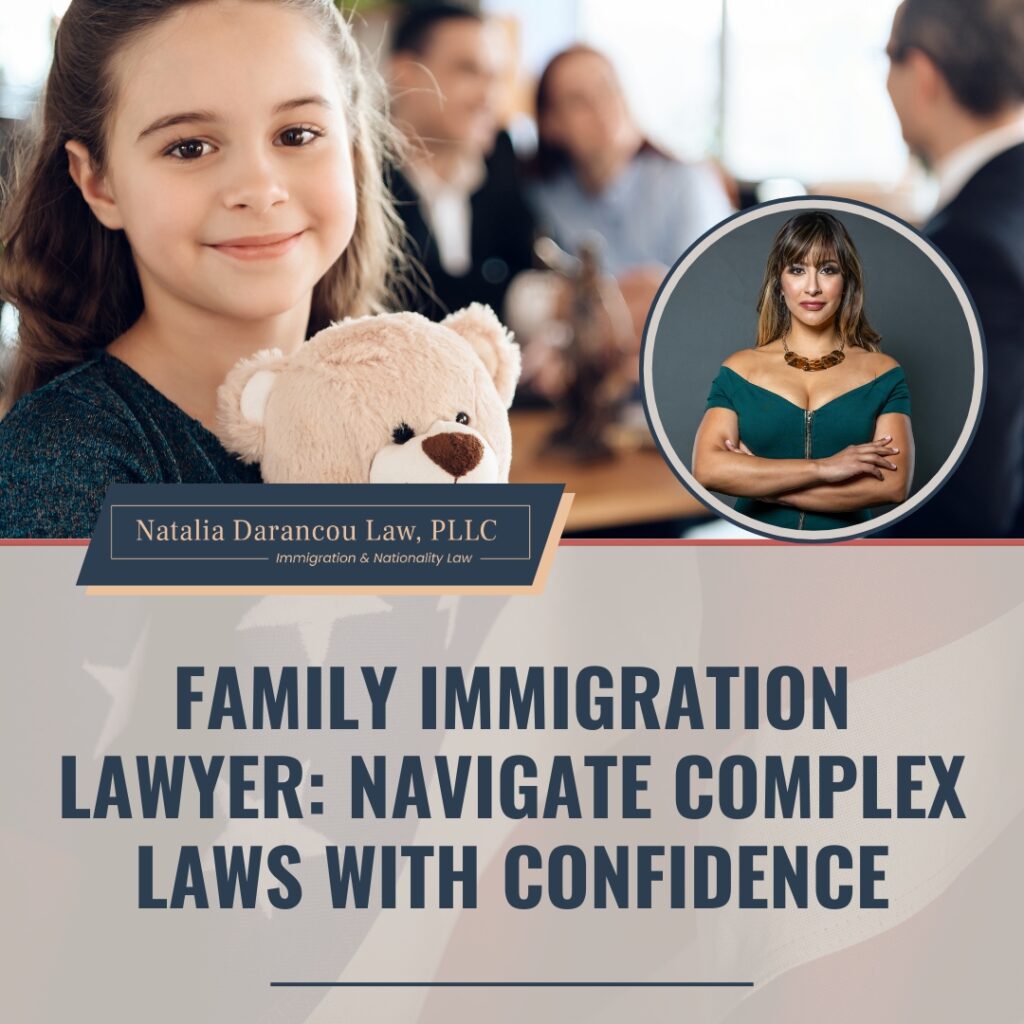Family Immigration Lawyer
Family-based immigration offers a pathway for families to reunite and build a new life together. However, the process is complex and fraught with legal challenges. This is where a specialized family immigration lawyer, like Natalia Darancou, can make all the difference.
Natalia Darancou Law specializes in family-based immigration, offering expert guidance and support to help families stay together. Here’s what you need to know to get started with a family Immigration lawyer.
Table of Contents

Request A Consultation Today!
Request Help Today
Get the Immigration Assistance You Deserve And
Schedule Your Consultation Today!

4.9 Google Rating
We have a 4.9 Star Rating with over 30 reviews on Google!

Woman Owned
We are a woman-owned company and proudly committed.

Native Spanish Speaker
Natalia Darancou was born and raised in El Paso, Texas to Mexican-American parents and is a native Spanish speaker.

Memberships
Member of the New York State Bar, Texas State Bar, and a member of the American Immigration Lawyers Association (AILA).
Understanding Family-Based Immigration
Family-based immigration allows U.S. citizens and lawful permanent residents to sponsor certain family members to immigrate to the United States.
Types of Family-Based Immigration
There are two main categories of family-based immigration:
- Immediate Relatives – This category includes spouses, unmarried minor children, and parents of U.S. citizens. There are no annual quotas, making the process somewhat faster.
- Family Preference Categories – This includes adult children and siblings of U.S. citizens, as well as spouses and unmarried children of lawful permanent residents. These categories are subject to annual quotas, which can lead to longer waiting times.

Eligibility Criteria
For sponsors, eligibility criteria include being a U.S. citizen or a lawful permanent resident, and demonstrating the ability to financially support the beneficiary. For beneficiaries, eligibility often requires passing background checks, medical examinations, and proving the familial relationship to the sponsor.
How to Sponsor a Family Member (Step by Step)
- Determine Eligibility: Before you start the process, ensure that both you and your family member meet the eligibility criteria. This includes verifying your status as a U.S. citizen or lawful permanent resident and ensuring your family member qualifies under either the Immediate Relatives or Family Preference Categories.
- File Form I-130: The first step in sponsoring a family member is to file Form I-130, Petition for Alien Relative, with the United States Citizenship and Immigration Services (USCIS). This form establishes the familial relationship between you and the beneficiary. Along with Form I-130, you’ll need to provide supporting documents such as proof of your U.S. citizenship or residency, and evidence of the relationship
- Wait for USCIS Approval: Once the I-130 petition is filed, USCIS will review it. This can take several months depending on the category of the petition and other factors. If the petition is approved, it doesn’t mean the beneficiary can immediately immigrate to the U.S.; rather, their priority date will determine when they can proceed with the next steps.
- National Visa Center (NVC) Processing: After USCIS approval, the case is transferred to the National Visa Center (NVC). The NVC will assign a case number and invoice fees for visa processing. Here, you’ll submit additional documents and forms, such as the Affidavit of Support (Form I-864) to demonstrate financial capability.
- Attend Consulate Interview: Once the priority date is current, the beneficiary will be scheduled for an interview at the U.S. embassy or consulate in their home country. During the interview, they must present original documents and answer questions about their application.
- Receive Visa and Enter the U.S.: If the consular officer approves the application, the beneficiary will receive their visa and can travel to the U.S. The visa must be used before its expiration date. Upon arrival in the U.S., they will be admitted as a lawful permanent resident.
- Adjustment of Status (If Applicable): For beneficiaries already in the U.S., it may be possible to adjust status to become a permanent resident without leaving the country. This involves filing Form I-485, Application to Register Permanent Residence or Adjust Status, and attending an interview at a USCIS office.
Navigating through these steps requires meticulous attention to detail and an understanding of the immigration laws. This is why having a seasoned family immigration lawyer like Natalia Darancou can be invaluable in guiding you through the process, ensuring all requirements are met, and helping to overcome any obstacles that may arise.
Don't Risk Your Future By Taking On The Process Alone!
The Importance of Legal Counsel
Family-based immigration laws are intricate and constantly changing. Engaging a family immigration lawyer can significantly streamline the process and increase the likelihood of success.
The immigration process involves a plethora of forms, documents, and deadlines. One mistake can lead to delays or even denial of your application. A knowledgeable family immigration lawyer can help you avoid these pitfalls by ensuring all paperwork is correctly completed and submitted on time.

Benefits of a Family Immigration Lawyer
A specialized lawyer can offer numerous benefits:
- Expertise in handling complex cases involving multiple family members.
- Up-to-date knowledge of changing immigration laws and policies.
- Personalized advice tailored to your specific situation.
- Representation in court and during interviews, providing peace of mind.
Common Challenges and How to Overcome Them
Despite your best efforts, you may encounter obstacles during the immigration process. Here are some common challenges and strategies to overcome them.
Lengthy Waiting Periods
One of the most frustrating aspects of family-based immigration is the long waiting periods, especially for those in family preference categories. Staying organized and keeping track of your application’s status can help you manage these delays better. Additionally, a family immigration lawyer can sometimes expedite your case by identifying and resolving any issues early on.
Documentation Issues
Incomplete or incorrect documentation is a common reason for application delays or denials. Ensure all documents, including proof of relationship, financial statements, and medical records, are accurate and up-to-date. Legal counsel can help you gather and verify these documents, minimizing the risk of errors.
Legal Barriers
Certain legal barriers, such as past criminal records or previous immigration violations, can complicate the process. A specialized lawyer can provide strategies to address these issues, such as applying for waivers or appealing decisions.
Request a Family Immigration Lawyer Consultation
Family-based immigration is a vital pathway for reuniting families and building a new life together. However, the process is complex and fraught with challenges. Engaging a family immigration lawyer like Natalia Darancou can make the journey smoother and increase your chances of success.
If you’re navigating the complexities of family-based immigration, don’t hesitate to reach out to us for expert guidance and support.
Ready to bring your family together? Request a consultation with Natalia Darancou today and take the first step towards a united future.


